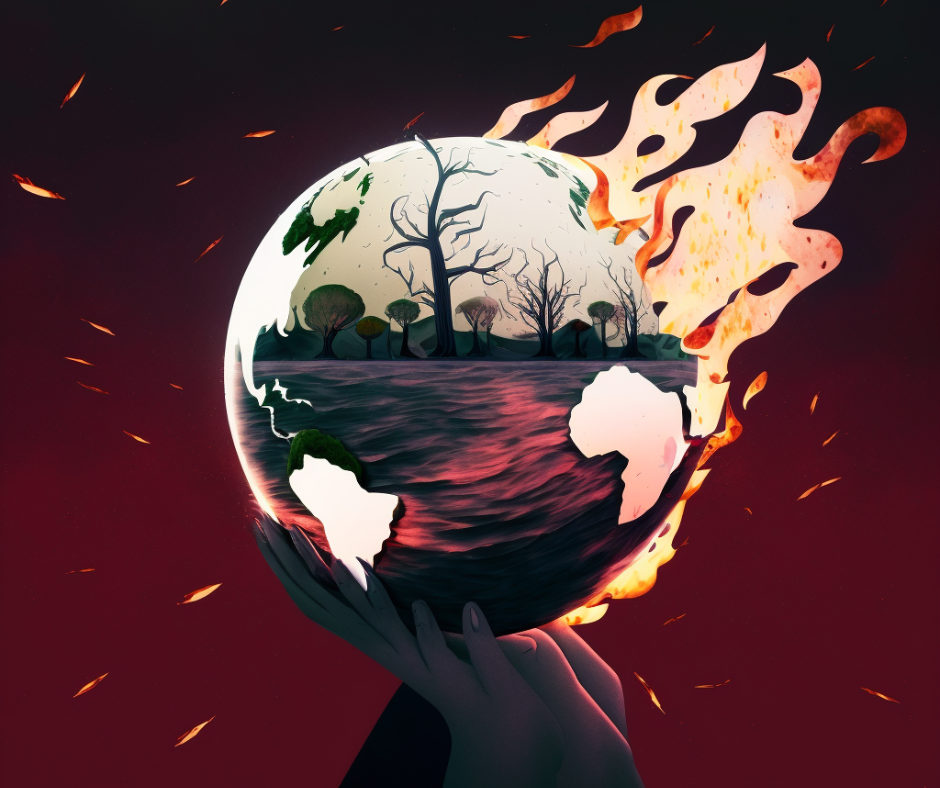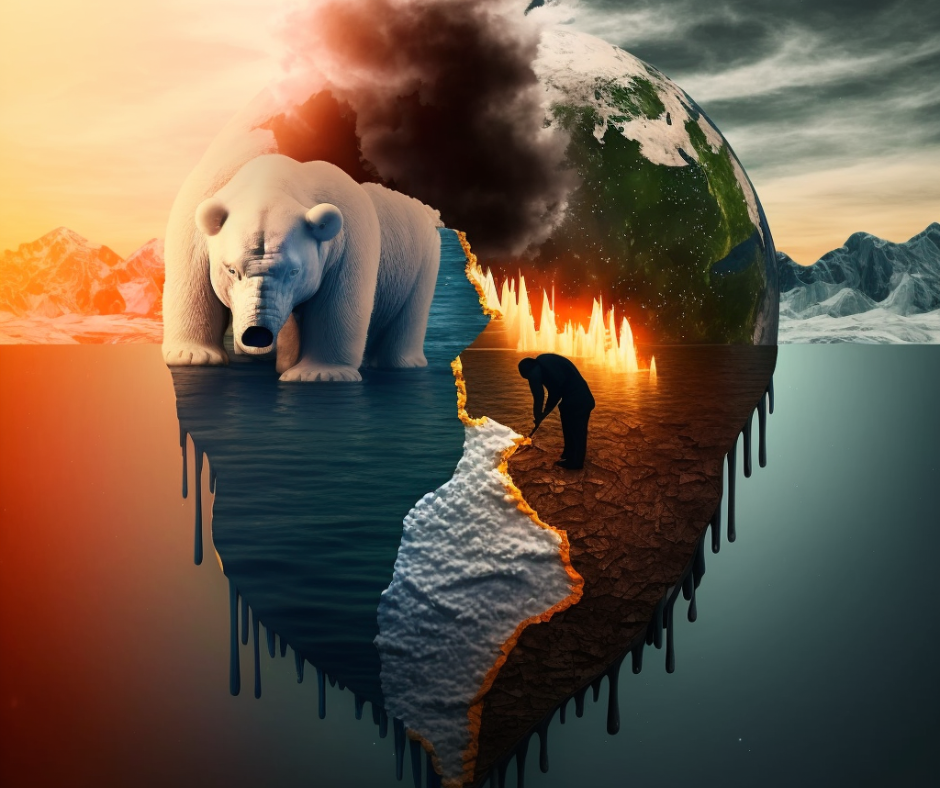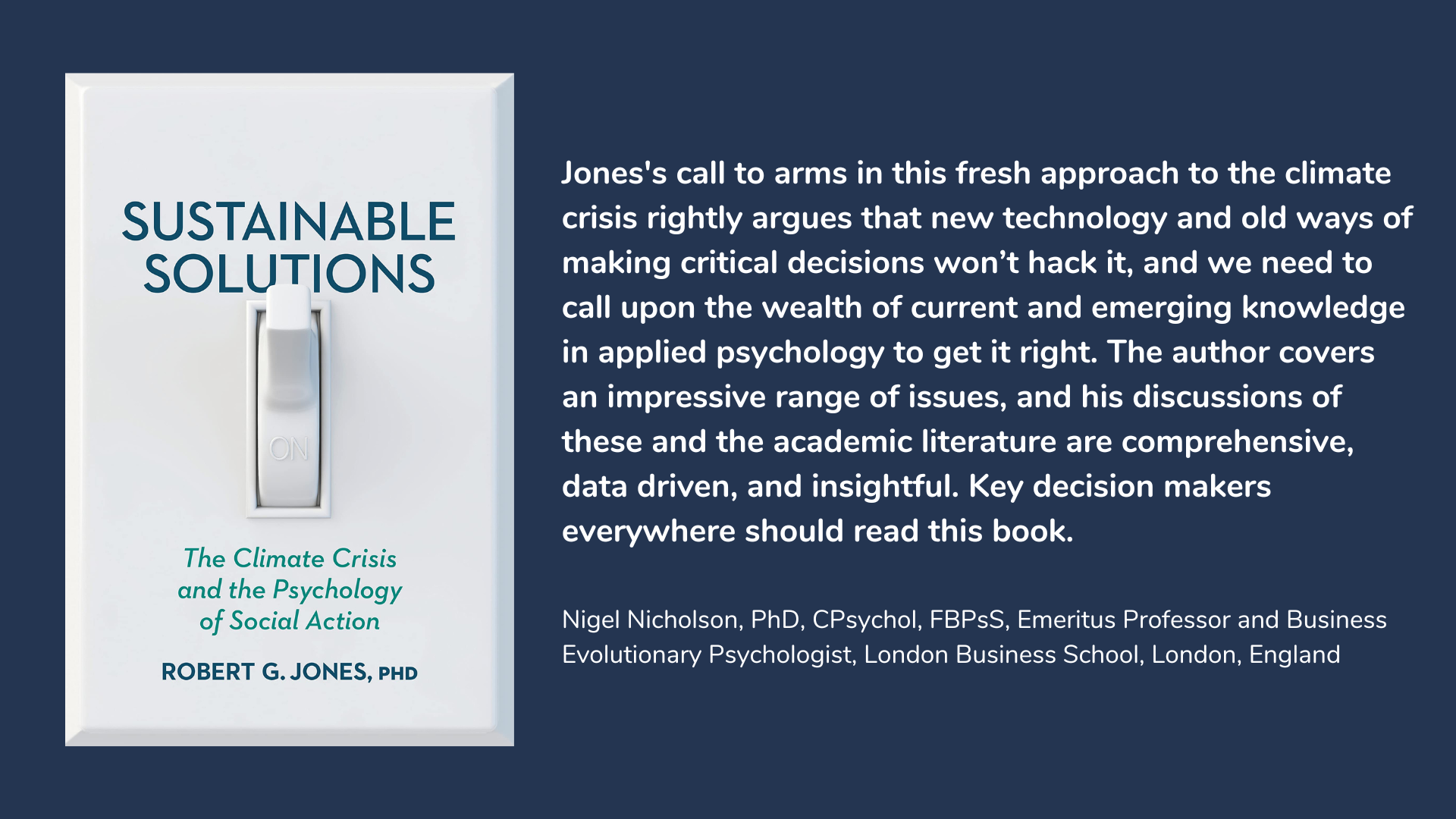Climate Psychology: Managing Ourselves in
Service of a Sustainable, Inclusive Future
Robert G. Jones, PhD

How do we harness our most adaptive, splendid human capacities in service of a sustainable, inclusive future?
The ability to form novel, innovative social organizations is our species' greatest asset. Every human invention, from mud huts to quantum computing, has relied on finding ways to organize multiple people across time, space, languages, and other barriers. Every technology we have devised to ease the ordinary challenges of survival and health has relied on this capacity-to organize ourselves in novel ways. Certainly, individual creative thinking - mental mapping-is required; but realizing these dreams always involves multiple contributors. Think of Leonardo Davinci's vision of flight, for example. His sketches and ideas found their way to reality through centuries of efforts from numerous other groups, right down to the massive aircraft manufacturing of today's jumbo jets. Often enough, individual mental modeling notwithstanding, such organizing to coordinate efforts has realized something that was, until that time, only imagined. In fact, I argue in Sustainable Solutions (2022) that our success as a species has relied entirely on this revolutionary new adaptative strategy - shared mental models that spawn new social species, usually in service of individual comfort and survival.
Evolutionary psychology provides the framework for understanding this adaptive strategy. Rather than succumbing to selection pressures (based on DNA dispersal-or not) or changing individual behaviors to adapt (learning), the huge variety of human social organizations has effectively blunted the ecological demands that lead to selection and learning-- sometimes massively. For example, air conditioning has made life far more comfortable in the Southern United States since its (social) invention and dissemination in the middle part of the 20th century. This has led to a dramatic increase in populations inhabiting this previously rural landscape-the "New South" is an example of massive social invention that blunts the usual difficulties of heat and humidity on human activity, comfort, and health.
That it does so at the expense of habitat loss, pollution, and water scarcities is evidence that the management of social invention is key to sustainability. The consequences of social invention have often satisfied one need at the expense of another; the comfort and security of one group of individuals has cost the health and security of other, larger groups-especially future ones. Understanding how to manage social invention in service of a sustainable future is the essence of what Rachel Carson called "managing ourselves." This is our great existential challenge: Managing social invention in service of a sustainable future.

For obvious reasons, climate science has received the lion's share of scientific resources in the interest of a sustainable future. The clear descriptions and predictions about climate, water scarcities, and other, external environmental problems come from this field. If we now hope to mitigate these problems, it is time to re-focus scientific efforts on our internal environments.
Science can start by understanding the conditions that led some smart prehistoric humans to figure out how to coordinate themselves to put up a roof on poles when they got kicked out of the family cave. The only way they could have done this was by somehow organizing a group to "hold up the poles while I put on the thatch." Since having figured out how to coordinate things like roofs (and air conditioning), and unlike any other creature, humans have fashioned an almost infinite number of social forms. Many of these social forms are based on primate hierarchies, some mimic other creatures and other human groups, and a few are almost entirely new social forms. This creative social invention is our hack-our evolutionary revolution. Managing the conditions that control social invention is the next target for sustainability science. We clearly need something to take over where climate science has left off; a science for managing ourselves; a sort of "climate psychology".
There is some good news here: Applied psychology, and especially Industrial and Organizational (I-O) psychology is widely used to inform decisions about social organization. There is some groundbreaking research in this field that can help move social innovation in the right direction. I-O takes an applied perspective, trying to predict and control, in addition to describing and understanding social organizing. Basic description and thorough understanding do matter-don't get me wrong-and a few scientists have taken up these basic research questions (most notably David Wengrow at Cambridge and Edward O. Wilson at Harvard). The applied perspective means trying to do something about the problems we face, using what we already know to take action to change things now.
If, like me, you see great urgency here, I encourage you to search for groups that will invent creative, long term ways to take ethically informed action. Start by taking aim at the social organizations that currently enable climate instability, waste, and water scarcity. Borrow well-informed methods from I-O psychology, criminology, epidemiology, ergonomics, political science, and other applied social sciences, remembering that creative social organizing is the most important and salient target of your efforts.
Managing climate change and creating a sustainable future for our planetmates rely on all of us focusing on innovative, shared mental models that account for otherwise voiceless future stakeholders.
Essential Reading
About The Author

Robert G. Jones, PhD is Emeritus Professor of Psychology at Missouri State University. He has consulted in organizational development and personnel decisions for over twenty-five years and has done public service work in community organizing for green space preservation and policy making for urban energy and growth management. His research and professional interests are in industrial and organizational psychology, and relate to management, prejudice, and ethical decision making.
Dr. Jones's other published work includes The Applied Psychology of Sustainability (Routledge, 2020; second edition). You can learn more about Robert G. Jones, PhD by visiting his faculty page.
